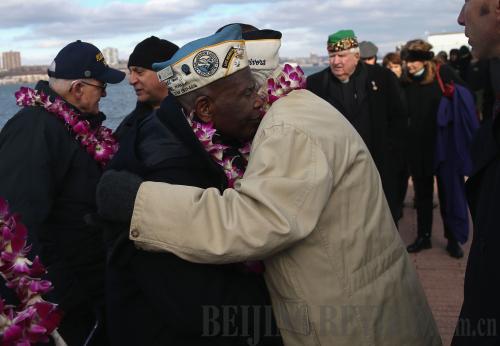|
 |
|
EMBRACING THE PRESENT: Survivors hug at a ceremony marking the 72nd anniversary of the attack on Pearl Harbor, Hawaii, on December 7, 2013 in New York City. The surprise attack by the Japanese killed some 2,400 Americans and brought the United States into World War II (XINHUA/AFP) |
Three leading Chinese scholars recently wrote in the English-language newspaper China Daily to express their opposition to Japanese Prime Minister Shinzo Abe's inability to face history. They also urged the Japanese Government to do justice to the past, honor its previous commitments and abide by the post-World War II international order. Edited excerpts of their articles follow:
 Gao Hong (researcher with the Institute of Japanese Studies at the Chinese Academy of Social Sciences): Gao Hong (researcher with the Institute of Japanese Studies at the Chinese Academy of Social Sciences):
From posing for photographs in a plane emblazoned with "731," the number that represents the notorious Japanese chemical and biological warfare research group Unit 731, and shouting "long live the emperor," a chant commonly used by Japanese soldiers during World War II, to visiting the Yasukuni Shrine, which honors 14 Class-A war criminals, Abe has exhibited his appreciation for Japan's militaristic past and a hard-line stance on territorial disputes with neighboring countries.
Why has Abe disregarded international and domestic opposition and insisted on paying respects to Class-A war criminals? Firstly, Abe's actions are the result of his interaction with his supporters and their inaccurate view of history, which shows that Japanese politics has taken a rightist turn. Since being elected Japan's prime minister for the second time, Abe has garnered the support of all right-wing elements in Japan by honoring war criminals and trying to revive militarism. The denial of historical facts, especially regarding the Yasukuni Shrine and "comfort women," and the revision of textbooks in an attempt to glorify Japan's militaristic past and overturn the judgment of the Tokyo Trials (1946-48) have provided Abe with the appropriate political environment to realize his political ambitions.
Secondly, under the cloak of "patriotism," Abe is using extreme nationalism to stabilize his administration. Among all forms of nationalism, "territorial nationalism" has the most powerful influence and greatest emotional appeal, especially in a country like Japan, which has relatively scarce natural resources. Japan's territorial disputes with its neighbors have not only marred its relations with China, the Republic of Korea (ROK) and Russia, but also fueled nationalist sentiments among many Japanese people, who regard China as an enemy, and detest the ROK and Russia. The result: a theory of Yamato superiority in the name of patriotism is coming into being.
Thirdly, Abe wants to use "active pacifism" to change the path of peaceful development that Japan took after World War II. The so-called active pacifism is nothing but an attempt to remove the military restraints on Japan imposed by the pacifist Constitution. It is for the purpose of lifting these restraints and turning Japan into a military power that Abe has been trying to portray China as a threat.
Because of these developments, China, the ROK and other countries that once suffered the brutalities of Japanese invasion have to establish regular communication and jointly safeguard the judgment of the international community and maintain peace and stability in the region.
But East Asian countries' efforts to promote peace and stability are not expected to be reciprocated by Abe-led Japan, because in Abe's view, history has nothing to do with concepts such as "right and wrong" or "good and evil" and he has argued even aggression has yet to be definitively defined by the academia or the international community.
By deliberately confusing right and wrong, Abe and his supporters aim to make a mess of history to glorify Japan's past aggression and then modify the pacifist Constitution. Their ultimate aim is to transform Japan into a military superpower. What Abe has been trying to do is not only harmful to East Asian countries, but in the final analysis, it will endanger the entire international community.
Let's return to the cardinal issue of historical rights and wrongs, because only by squarely facing history can a country chart the right future for itself. Is there a unified standard of "aggression and resistance" in civilized society? The answer is "yes" for all countries and individuals, except for Abe and his supporters. Without a basic sense of right and wrong, values such as fairness, justice, human rights, freedom and democracy lose their meanings.
If Abe and his government refuse to change their ways, they will indeed cause great harm to East Asia and the world beyond. But in the long run, Abe's designs will not interrupt the process of China's peaceful development nor can they stop the world's advance toward peace and prosperity.
| 